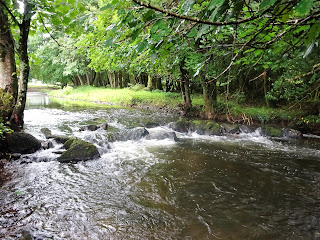Ed 14 Recreational Responsibility in Fishing
Lee Wulf once said “Game fish are too valuable to only be caught once”. In current times we ought to substitute ‘Any’ for the word ‘Game’. The increasing pressures on environment and climate alike mean that, more than ever before, fisherfolk have a major obligation for the welfare of the denizens of the underwater world we share the planet with. This is not merely a case of preserving our sport, we must also recognise that recreational fishers are the key guardians of all the sub-aquatic ecosystems, because of the vested interest, and also because of our world-wide spread and presence.
There have been
the great thinkers and writers in our sport, whether coarse, game, or salt,
(and all the other subdivisions of each). During the late nineteenth and
twentieth centuries, great strides were made by anglers and their associations
when the pennies finally dropped and realisation dawned that we could take the
sport of fishing further, alternatively, we could bring about its total demise
including wiping-out the fish stocks. An age of angling enlightenment began.
The time that a
fish is out of the water is critical to its chance of survival when
returned/released back into the water. Some species, for example Carp and freshwater
Eels, can be out of their element a bit longer than other species without
appearing to suffer, but because of different weather conditions and
temperatures it is best to be very cautious. Whatever the species, if you want
to return fish alive in the best condition to survive, pause a moment and
consider the following scenario: Imagine that you are peacefully enjoying a
picnic, when without warning you find some unseen force is hauling you away in
one direction. Alarmed, you resist, struggling to break free, pulling away from
this force as hard as you can, with your entire body-weight, muscles and sinews
straining as you use all the strength you can muster. The intense struggle
makes your body ache, tire and weaken, you find breathing more and more
difficult, but you are drawn onward, lungs and muscles seemingly bursting. Once
again without warning, you plunge suddenly into water, lungs heaving from the
exertion but unable to breath in this foreign element. Heart racing, how long
could you last without being able to take a breath? That is the analogy of
hooking a fish and lifting it from water into the air, a foreign element;
horrifying if that was happening to you!
Currently ‘best practice’ suggests that once you have your fish safely in the net, keep it there in the water for a few minutes until it is able to breathe more steadily, which you can tell by the mouth movements. While doing this you can plan and prepare for what will happen next. Lately I’ve come across the ‘thirty second rule’ many times, that is, do not hold a fish out of the water for more than thirty seconds, but a growing number of voices now say ‘fifteen seconds’, but the reality is that if the angler is properly prepared there would be no need to take it out of its own element. It is quite straightforward to unhook a fish submersed within a suitable landing net without taking it out of the water at all. If you must hold the fish to show someone, or take a photograph, or transfer it to a weighing bag or sling, break these things down with further intervals of keeping the fish quiet in the water. If you have to hold it, do not squeeze the body, support the weight with your hands underneath, and never, never lift it by the tail alone or by just its lip.




Comments
Post a Comment
Comments and/or feedback are always welcome